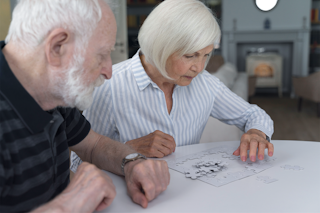Everything you need to know about Alzheimer’s disease
Alzheimer's disease is a reality that impacts many families. It may seem mysterious and frightening, but with the correct information and proper support, it's possible to better understand and cope with this bewildering condition. In this article, we'll tell you everything you need to know about Alzheimer’s disease, from what happens in the brain as the disease progresses to tips for communicating with someone affected.
What is Alzheimer's disease?
Alzheimer's disease is a common type of dementia. It's an irreversible and progressive brain disorder that affects a person's memory, thinking, and behaviour. As the disease advances, it disrupts cognitive functions and impairs an individual's functioning ability.
Who can be affected by Alzheimer's disease?
Alzheimer's disease doesn't discriminate. It can affect anyone, although the risk factor increases with age. However, it can also affect younger individuals, although this is less common.
Genetics can play a role, but they are not the sole cause. Science is still exploring the many facets of this complex disease.
In most individuals with Alzheimer's disease, the first symptoms manifest around the age of 65. Contrary to common belief, Alzheimer's disease is not a normal consequence of aging. This disease, which affects nearly 600,000 Canadians, progresses gradually and initially impacts short-term memory.
The early signs of Alzheimer's disease
The initial signs of Alzheimer's disease can be subtle and are often attributed to normal age-related forgetfulness. It begins with mild forgetfulness and some confusion, eventually leading to severe disturbances in thinking, memory, and behaviour.
Attention to these early signs is essential because early diagnosis can help slow the disease's progression.
- Short-term memory loss: Forgetting recently learned information, dates, or events.
- Difficulty solving simple problems: Routine tasks become more challenging, like following a recipe.
- Temporal and spatial disorientation: Getting lost in familiar places or forgetting the date or season.
- Language issues: Difficulty following or engaging in conversations.
- Mood and behaviour changes: Confusion, suspicion, depression, or anxiety.
The signs and symptoms of Alzheimer's disease vary from person to person. Your loved one may start in one stage and skip stages as the disease progresses.
The progression of Alzheimer's disease
The stages of Alzheimer's disease are often described in seven stages of declining abilities. The severity of symptoms you observe depends on where your loved one is on this spectrum.

- Stage 1: No cognitive decline
- Stage 2: Very mild cognitive decline
- Stage 3: Mild cognitive decline
- Stage 4: Moderate cognitive decline
- Stage 5: Relatively severe cognitive decline
- Stage 6: Severe cognitive decline
- Stage 7: Very severe cognitive decline
The mild stage of the disease is the least severe and least advanced. Your loved one will likely still be able to function independently but may need help with some tasks. For example, they may struggle to remember recent events or follow complex instructions.
The moderate stage is more advanced. Activities of daily living become more complex, and individuals begin to lose functional abilities. This is usually the point where personal or professional help becomes necessary.
The severe stages start to affect long-term memory. People with Alzheimer's disease can no longer stay alone. They lose all their bearings and require increasing assistance as their verbal and physical abilities significantly diminish.
How to live well with Alzheimer's disease
While each journey is unique, living well with the disease during the early stages is possible by incorporating certain practices into daily life. These practices can reduce the risk of various health issues, slow the progression of the disease, and ease the management of its accompanying changes.
First and foremost, individuals with Alzheimer's disease need to consult a healthcare professional for a correct diagnosis and a treatment plan capable of stabilizing the disease's progression.
Once the diagnosis is established, educating yourself about the disease is vital. The more you understand Alzheimer's, the better equipped you'll be to make informed decisions and assist your loved one.
Discuss care preferences and financial matters with your loved one while they can do so.
Help your loved one maintain their independence for as long as possible before personal assistance becomes necessary. This assistance can come from you as a caregiver or professional help once the disease progresses to an advanced stage. A balanced diet, regular exercise, and mental stimulation can improve their well-being.
As a caregiver, don't neglect your health, and avoid isolating yourself. Support from friends, family members, or support groups can make a significant difference.
How to communicate with a loved one affected by Alzheimer's disease
Alzheimer's disease can affect a person's ability to comprehend others and process information. People with the disease also struggle to express themselves. This makes it challenging for them to request what they need or even recognize what they need. Verbal and non-verbal communication then becomes key to providing good care.

Here are some measures you and those close to the person with Alzheimer's disease can take to facilitate effective communication:
- Keep conversations simple and brief.
- Try to limit each conversation to one topic at a time.
- Be flexible and adaptive.
- Use body language.
Alzheimer's disease is a complex journey, but with the proper knowledge and support, it's possible to live life fully despite the challenges it poses. It's crucial to remember that each person with Alzheimer's disease is unique, and there are ways to adapt and provide loving, warm support to all those affected.
The information in this article is drawn from various sources. We hope this is helpful, but please note that it does not replace the advice of a physician.
Discover our services
We provide private healthcare services focused on personal touch